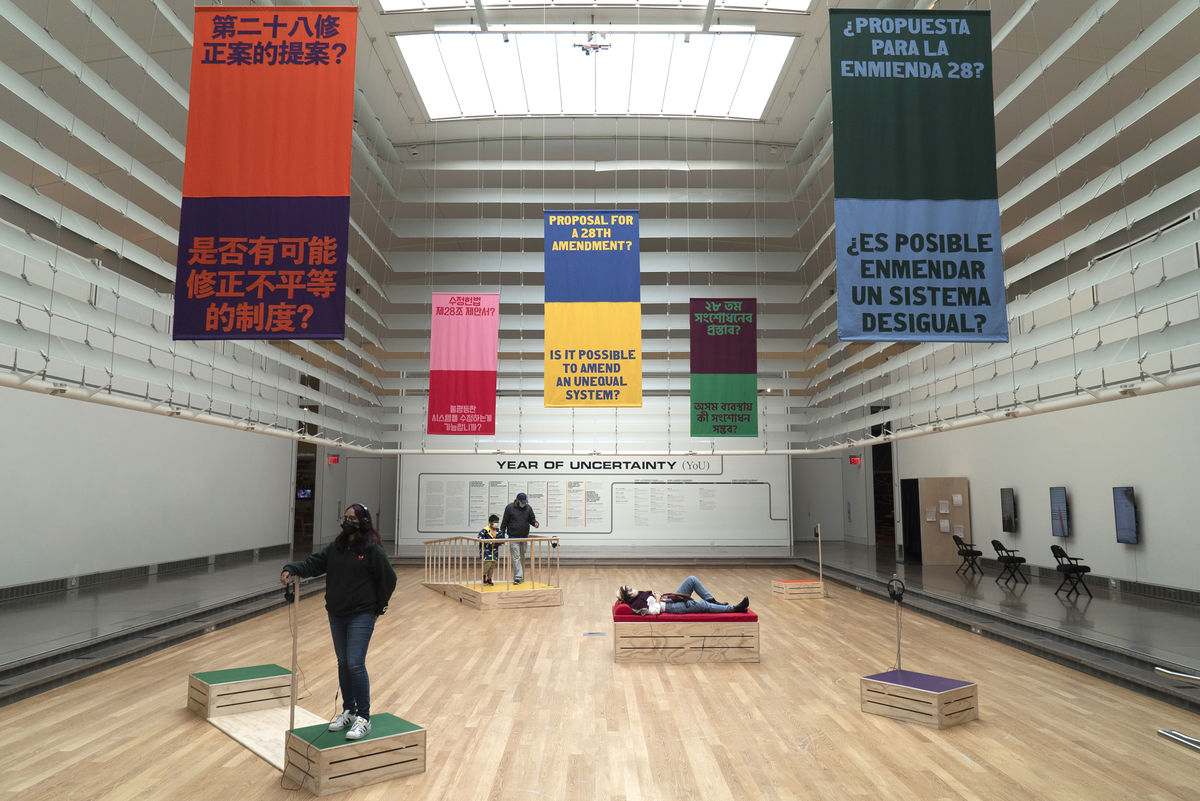“Proposal for a 28th Amendment? Is it Possible to Amend an Unequal System?” courtesy of Alex Strada
Alex Strada, Assistant Professor of Photography and one of the current artists-in-residence at The Queens Museum, was profiled on WNYC Radio’s Brian Lehrer Show with her collaborator, Tali Keren, in December. Their project, “Proposal for a 28th Amendment? Is it Possible to Amend an Unequal System?” is a part of the museum’s Year of Uncertainty installation, on view until Feb. 13, 2022.
Year of Uncertainty captures themes that feel all too relevant to the average viewer’s experiences through the COVID-19 pandemic. Care, repair, play, justice, and the future are all interwoven through the installation’s various segments. Strada and Keren find ways to focus heavily on each of them with “Proposal for a 28th Amendment? Is it Possible to Amend an Unequal System?”
Intended to be a “multi-media, participatory, and incomplete” piece, according to Strada and Keren, the installation invites people to consider how they would amend the existing political structures embedded in the Constitution, and asks if it is even possible to amend a system that from its founding is inherently unequal. The underlying questions driving this work were the subject of a recent live call in segment and interview with the artists on Brian Lehrer. Strada and Keren’s project incorporates various types of soapboxes, which represent their history as sites of collective struggle and protest and are used in this instance as listening devices and serve different types of viewers. One soapbox can fit a single person; one is large enough for two people, which encourages discussion and collective listening; one is fully ADA accessible for wheelchair users; one is set up like a daybed to encourage relaxation and imagination. No one soapbox represents the same body of people, they represent the unfairness of an unequal system, and how that system would look if it were changed. The soapboxes are displayed under several banners that repeat the project’s title in languages that are the most common in the Queens area, reinforcing the need for equal representation within government practices.
Strada and Keren approach art and exhibition-making as “sites for radical imagination,” Strada says. This display encourages contemplation, discussion, and debate of all kinds, building off that aforementioned “incompleteness” of this specific project. “Proposal for a 28th Amendment? Is it Possible to Amend an Unequal System?” relies heavily on viewer engagement. It’s also activated through workshops by Queens-based community partners and legal scholars such as We the People?//Nostrxs la Gente?, Call to Care: Protecting Flushing Creek through the Rights of Nature, and Teen Power: Political Futures.
Strada and Keren are acting as artists in residence for 18 months with the Queens Museum, which gives artists and community groups fiscal support and exhibition opportunities. “The artists are completely enmeshed in the innerworkings of the museum throughout the residency, meaning that in addition to having studios on site we also go to staff meetings and are part of decision-making processes about Year of Uncertainty. The museum is hoping to create a new model for institutions to become more responsive to artists’ needs, directly in support of local grassroot orgs, and transparent about museum policies and processes,” Strada explains.
Strada and Keren hope to grow and develop the project across other national exhibition sites after its closing at The Queens Museum.
